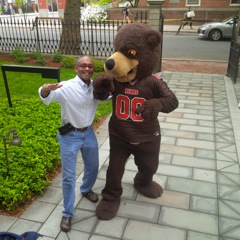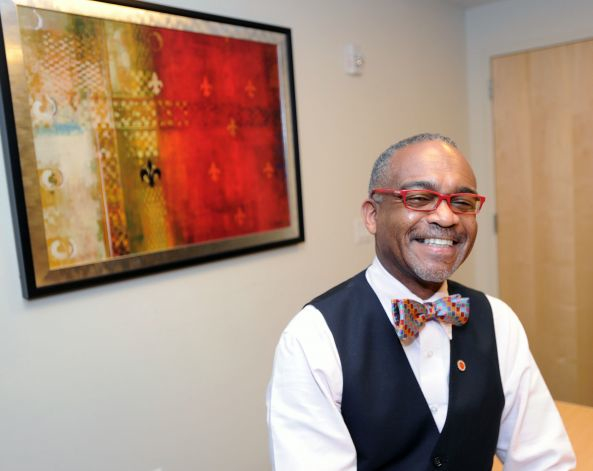
May 12, 2015 8:04 am Dr. Lowe Explores Global Implications Of College Admissions
We took the opportunity to do an in depth interview with Dr. Paul Reginald Lowe, founder of Greenwich Admissions Advisors. Dr. Lowe specializes in helping students and families navigate the private school, college and medical school admissions process. For over 15 years, Dr. Lowe has successfully helped many domestic and international students achieve their educational dreams by gaining admission into U.S. day and boarding schools, Ivy League schools, highly selective colleges and universities and U.S. accredited medical schools.
Last month’s interview with Dr. Paul Reginald Lowe of Greenwich Admissions Advisors featured advice to high school students and their parents about preparing for the college admissions process. This month focuses on the global aspect of college admissions. Part 2 of our interview is featured below.
1. You have mentioned global competition for top private schools and colleges. Can you elaborate?
Many U.S. parents are under the assumption that their children are competing just with other U.S. children for those coveted private school as well as Ivy League and top-tier college spots. Far from the reality! The wealth effects of the stock market and real estate values combined with stability of the U.S. economy have now allowed affluent international parents to look at the education of their children as their premier investment with superior ROI.
2. What advice would you give to an applicant who has been rejected from his/her first choice school?
We receive many calls after regular decisions are made from anxious parents whose children have been rejected from their first choice school. I quickly assess in a phone conversation what went wrong and try to provide options that include but are not limited to: settling for their safety school, possible gap year, possible post graduate year or transferring after their freshman year. I don’t believe that students, after all their hard work, should settle. They should continue to strive for the best.
3. I have read that 97% of your clients get accepted to their top choice schools. How do you do that?
Firstly, college admissions is not formulaic; it’s an ever-changing admissions landscape. Most students (and their parents) use the same formula, read the same books, visit the same websites and talk and agree with each other on the same issues and inevitably wind up sounding uniquely the same on paper and in person. Understanding the sameness in this demographic dynamic makes it easier to prepare my clients to stand out and get in. Secondly, I use my critical thinking and scientific skills developed as a physician-scientist, my musical skills as a jazz musician, my visual and spatial skills as a painting artist and my competitive skills as a former scholar-athlete (soccer) and current competitive table tennis player to identify how a student must distinguish themselves on their applications and in person to successfully compete throughout the admissions process. I look at the cultural, emotional and communicative intelligences of my students (or lack thereof) and see how we can augment them. Thirdly, the cultural and ethnic diversity in my admissions team allow us to think inside and outside the box and provide our clients with cutting-edge knowledge and insider perspectives that gives them an admissions advantage to get into their dream school.
4. Does GAA serve college students who wish to transfer from one school to another?
We help college students through the college transfer admissions process. Increasingly, we are seeing students who wish to transfer because they are unhappy at their current college or because they want an upgrade to a more prestigious college. Recently, we launched a separate affiliate, College Transfer Admissions Advisors, to accommodate dissatisfied college students. We have discovered that prospective transfer college students are basically on their own during this process. They are without the help of their high school guidance and college adviser in a process that is more competitive than when they had applied to college the first time.
5. What percentage of your clientele is from outside the U.S.? What kind of students are they and what are the main countries they come from? Has the percentage of foreign applicants increased in the past decade? How does their presence affect American applicants?
About 60% of our clientele is from outside the U.S. Many are from Brazil, Russia, China, India, Singapore, Malaysia, Philippines, Ghana, Nigeria and the UK. The percentage varies from year to year depending on the geopolitical and economic climate of these countries. We also work with international families who reside in the U.S. or whose child attends a U.S. boarding school. My client-families want the best competitive advantage for their children and are willing to pay for expert advice. Their view of utilizing the services of an admissions advisor is more of an investment rather than a cost. They understand the adage: “You get what you pay for.” To international families, education is seen as an investment in wealth transference and preservation and in their children’s future lives. I emigrated to the U.S., from Jamaica, when I was 5, my wife, who is Black-American is also an Ivy Leaguer and all our children were accepted early decision to and attended Ivy League schools, so I clearly understand the importance and value of education and specifically the value of educational pedigree in the U.S from an international and U.S. prospective.
There has been an increase in the number of international applicants due to the ease of online applications both to private schools and colleges. International families covet U.S. education and they hire consultants who understand competition and to successfully navigate the process.
Students who once thought of themselves as majority students are now competing on a new level with international students who desire U.S. educational pedigree. I believe many high school students in suburban public schools and some private high schools may be at a disadvantage because of the new paradigm shift in the global college admissions competition. Universities, especially, Ivy League and top-tier colleges, desire a more globally represented and diverse campus community.
6. Have you ever considered advising Greenwich parents how to get their children accepted to popular private schools in Pre K or Kindergarten?
Private school admissions is also a part of our services. We help Greenwich parents through the process to get their children into the most prestigious and elite day and boarding schools. We are actually seeing an uptick in the number of Greenwich parents who are opting out of public school and seeking private school choice. We are also involved in secondary school placement to elite private high schools.
7. What makes someone a successful applicant for a prestigious medical school?
I advise my client-applicants to simply convey in a meaningful and convincing way to the medical school admissions committee why they want to be a medical doctor. That’s easier said than done. They should send supportive documents that support their individual medical school admissions profile. High GPA and high MCAT scores are not the only criteria used in admissions. When I work with high school applicants who are applying to Combined BS/MD Programs the admissions process is different in that they are being reviewed by the undergraduate as well as medical school admissions committees. They have to convince both admissions offices.


